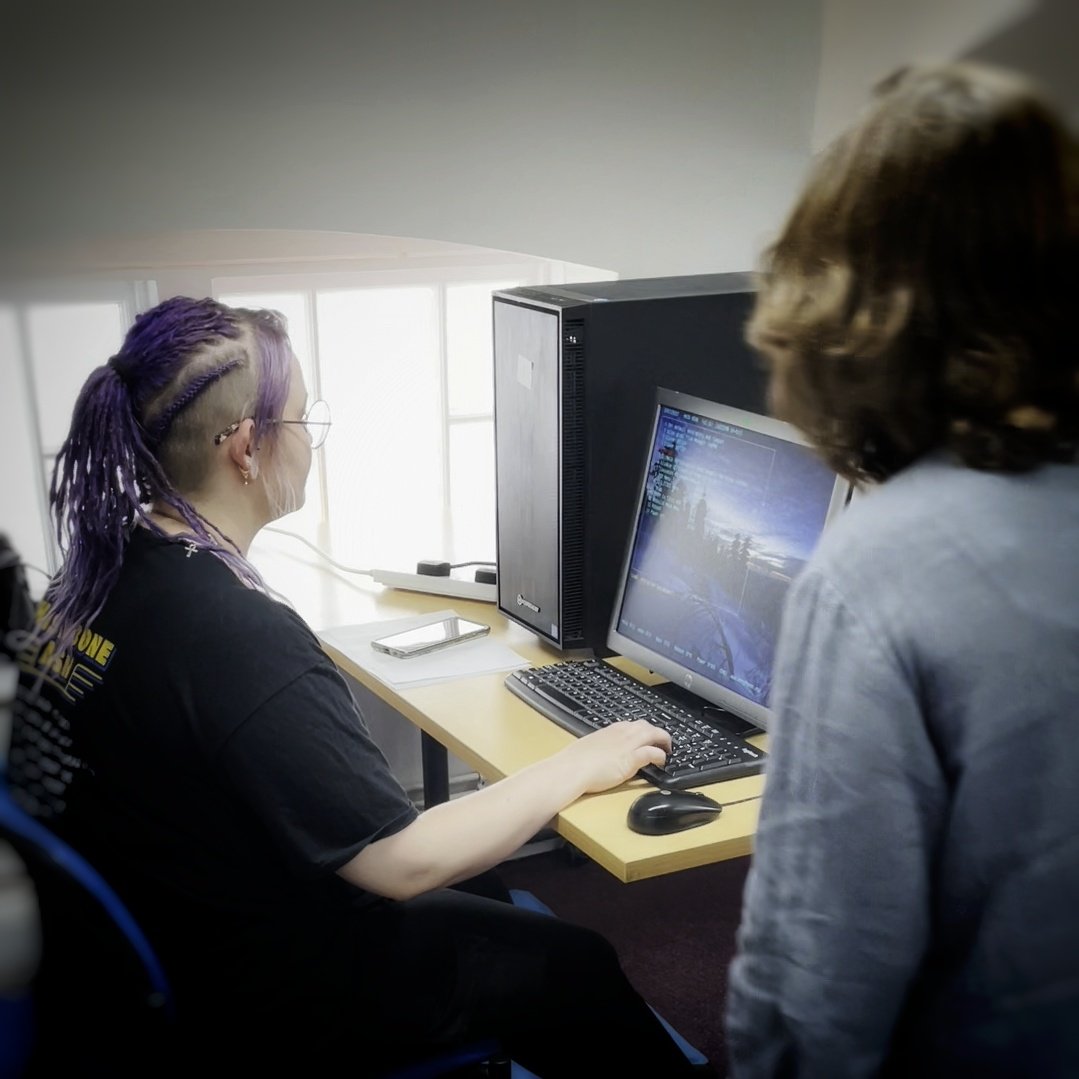Our first Fixing Factories training course!
A few weeks back Dermot from Camden Fixing Factory called in on our inaugural Fixing Factories cohort at the training course provided by our partners Mer-IT. The offer was a week’s deep dive into computer diagnosis and repair, followed by five weeks work experience for eleven young people from Brent and Camden - read below to see how they were getting on
It’s a short but oppressive walk from the tube station this sultry June afternoon - one of those summer days when you casually look outside and are surprised to see it’s been raining, yet a thunderstorm wouldn’t really be out of place. Upstairs in the Beethoven Centre, in Westminster’s Queens Park area all the roof windows are wide open and some large fans are doing their best, but the room is defiantly hot.
I’m with my colleague Kai. I’m here to say a brief hello as project manager from the upcoming Camden Fixing Factory, and Kai’s poised to capture footage for social media ‘reels’ - there was no intention to write about it - so quotes won’t be verbatim - but I feel it’s worth a few moments of my time to capture what we saw, and I hope yours to read.
An array of desks flank the room, each with a pair of large - and very smart looking - desktop computers on them, each with a warm glow of orange internal lighting, and fans whirring to keep their components cool, but unthinkingly adding that heat to the room - at the back someone’s perspiration-soaked jacket is draped over the radiator…but on a day like this its chances of drying are slim…in short it’s a day when many of us might find ourselves struggling to focus, our productivity stifled by the close weather - I experience a multi-decade flashback to my GCSEs - seemingly cruelly timetabled on days where it was glorious outside and too hot to concentrate on exams, breeding a lethargic resentment. And yet that’s not what’s happening here today: this is a room of 11 energised young people - demographically smashing the race and gender norms of the tech industry. Our two tutors Alex and Mercedes (she’s the ‘Mer’ of Mer-IT) are delivering the training - expert and on point, and ready for the inevitable bumps in the road - they’re feeling the heat, but if they’re bothered they’re not letting on.
So here we are: young people in a room, glued to screens while it’s glorious outside? Think you recognise this scenario? But they're not watching TikTok or YouTube, messaging or playing games - they're adjusting BIOS settings, installing and configuring Linux operating systems, and learning how to install applications - all but one of the trainees was coming to computer hardware from the the position of absolute beginner - and although there were different levels of prior experience with software I got the impression that Linux was a whole new world for most of the room.
This is day four on a rollercoaster of a course - previously they learned the fundamentals of personal computer architecture, built their own PCs from boxes of parts and tested them until the hardware all played nicely.
By the way: if you don't know what some (or any) of the above means - it all sounds like techno-babble and jargon - then you're in the same boat as our inaugural Fixing Factory cohort just a few days prior…but from what we saw they were fast becoming techno-lingual.
The supportive environment here is unlikely to trigger traumatic school day experiences - in this small class everyone is in the same boat…and with Mercedes and Alex as joint captains you can tell that boat is going to arrive at the finish with everyone on board.
One of the students is racing ahead - Alex oh-so-gently pulls him back, ensuring important parameters are entered exactly the same for every computer, this is not the time for going off piste - but later (when everyone is through the critical stages) he fires some high level information his way, encouraging solo exploration: acknowledging this student’s ability and supporting his energy.
Things go a little wrong - here and there some hardware refuses to play ball, or the internet bandwidth can’t handle half the room suddenly discovering they’ve configured the wifi successfully and can log into YouTube - these all become learning points - with questions lobbed into the room by Alex and Mercedes and quickly caught and answered by one of the cohort - and tellingly, the answers come from around the room, it’s definitely not always the usual suspects responding.
This is a quality course - hard work, with very little course work, but a healthy slab of hands-on doing. An emphasis on precision and procedure, but there's a side serving of ‘think for yourself’.
We wait while the class gets to a point where we can break - and here’s our opportunity for Kai to capture some video to make Instagram ‘reels’. We go into a slightly cooler side room and have about 10 minutes to capture what we need - the timetable has very little slack! The young people are friendly and eager to show what they’ve learned, and the value this course holds for them. Out of the classroom they break out in chat: stories of life plans interrupted and this as a route back to stability, a self-confessed ‘breaker of all tech she ever looked at’ looking to reform and a young woman who’d loved computers and coding at school but hadn’t found the opportunity to follow it up until now.
We tentatively ask them about the environmental aspects of what they’re doing - we’re from an environmental charity - and get confident replies showing they understand the gravity of the e-waste problem, and the value of repair as part of the solution.
I fire a question - perhaps to test if the course has made them overconfident (being a professional fixer is a life-long education, and this was a one week course!)...me: “your friends and family will be queuing up at your door now they know you’ve been on this course. How will you handle that?”
“I’ll tell them I’ll have a look, but I’m not a professional, and I won’t do anything I’m unsure about” is the distillation of the various answers - eager to carry on repairing, but aware of where they are on the experience spectrum. Test passed, and I feel a little guilty for asking, but pleased with all I’m hearing.
The young computer whizz is using the 'command line' to access applications - an advanced approach of typing code into an on-screen terminal, rather the the ‘clicking icons’ approach that’s most people’s experience of computers - and he's clearly done this kind of thing before, and likely much more. But everyone on this course is confident handling their machines: unplugging cables, swapping out sticks of RAM, and eagerly telling us how the instructors gave them troubleshooting challenges - a non-working computer with just a few words describing the problem: ‘no picture’, ‘only white words on the screen’ - “This is exactly how broken equipment might come to you” one of the trainees explains - “and we'd only have that to go by” - there's good natured banter between pupils and teachers - as you can tell when they quote back one of the hints for a ‘no picture’ fault: a real head-scratcher problem of a PC that seemed to be in perfect health. All internal parts were securely seated and connected, leads checked, screen working - there was just no picture, and the troubleshooting checklist was seemingly exhausted…until Mercedes prompted the students to ‘think outside the box’. Ah! An external gaming unit was plugged into the computer - the ‘box’ - this was activating internal switching meaning there was no image signal being sent to the screen - hence the ‘no picture’ issue…they’ll never miss that ‘fault’ again, and they’ll think outside the box whenever diagnosing faults...I bet some of them will spring this teaching trick in future, perhaps when they're training a future generation of fixers?
Filming time’s up, and Kai’s happy with what he’s captured, so it’s back to the classroom to continue the journey.
The young trainees are here no doubt for a variety of reasons - some already interested in fixing things with an eye on this as a career path, others lured by the prospect of ‘build your own PC to take home’ or wanting to add skills to their CV...some no doubt nudged by families and support workers, and others perhaps just for something to do: the majority have been economically inactive for extended periods. But it seems not to make much difference looking around the room - they appear to be a homogeneous group of carefully matched peers. As an insider I know that this course required no educational qualifications or relevant work experience, just an interest in fixing things, and I can see that this refreshingly open approach has paid off big time.
This is the education that I'd loved to have had back in the day - everyone progressing together, but not as an excuse for someone to drag the class down - there's an underlying ‘no BS' vibe that Mercedes and Alex seem to have laid down and everyone’s bought into it.
It’s time to go, so we say our goodbyes and leave the class getting on with the next stage - I realise I was so absorbed in watching and listening that I’d completely forgotten about the stifling heat, but when I descend the stairs to the lobby to leave it hits me how much cooler it is there.
Later I get to see some anonymous feedback from one of the trainees - Q: ‘Was the course what you expected?’ - ominously ‘no’ is firmly circled…but it turns out that this is because the course exceeded all expectations - a lovely line “not to sound rude but I didn’t expect the education to be so well done, and enjoyable at the same time, would definitely recommend and come back”.
Well, I was just an observer for an hour or so, but my un-anonymous feedback is this: what I've seen has given me a vision of the future of repair and with this quality of training and smart, engaged young fixers like this, that future could be very bright.






